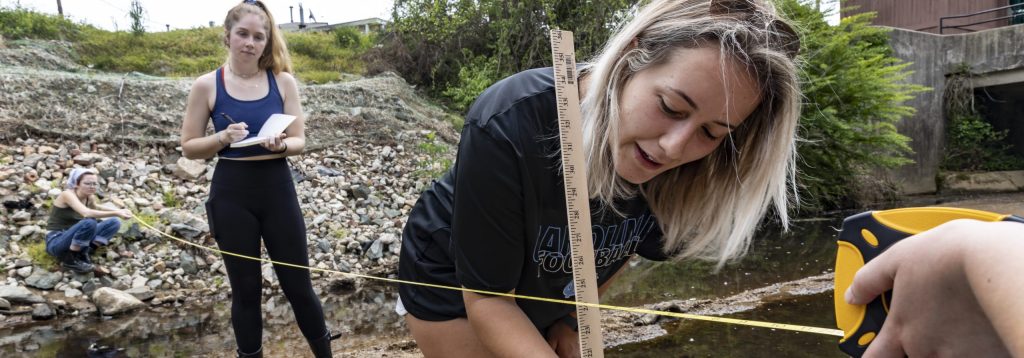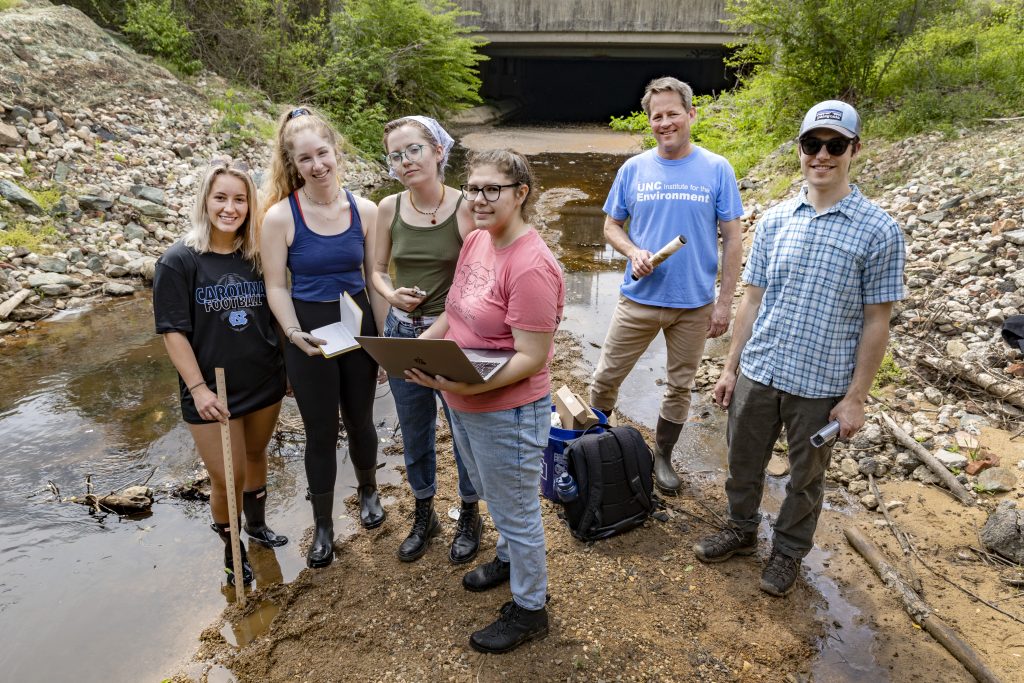“Looking back on my time in the STFS program, I feel a great sense of pride and appreciation. The work was challenging but rewarding. I came out of it as a stronger scientist, writer, and learner. I am grateful that I had the opportunity to be a part of this program and I cannot recommend it enough.”
Read more.
Sustainable Triangle Field Site
Location
The Sustainable Triangle Field Site (STFS) has a refreshed focus and course offerings made possible through a close collaboration with Sustainable Carolina. Students will build and apply their sustainability skill sets and follow their research interests to solve real-world sustainability questions facing the university and the Town of Chapel Hill. The new collaboration with Sustainable Carolina builds from previous successful partnerships by providing an insight into the ways through which universities, communities, industries, and government and nonprofit organizations work together toward a sustainable future.
The STFS offers students a unique setting in the Research Triangle to pair academic studies in the environment, urban planning, urban design and related fields with practical experience delivered through internships, capstone research projects and field trips. Students gain a background in stakeholder and client interaction, research translation, project management, and presentation of findings as an added benefit for future job prospects in the vibrant sustainability field.
Timing
The field site is designed to run spring semesters, with all components offered concurrently. However, students are not required to complete the field site requirements in one semester, if course sequencing or other factors prevent a student from doing so; some courses (e.g., capstones, internships) may be picked up in fall semester. Note that the rotation of STFS and other Sustainability Minor courses, along with students’ own scheduling constraints, call for careful academic planning so that students can successfully incorporate the field site into their UNC undergraduate experience.
Coursework
Students will take three courses – Complete Streets (PLAN 590), Community Design and Green Architecture (ENEC 420), and one additional class from the sustainability minor course list – along with an internship (ENEC 393), a one-credit environmental seminar (ENEC 204) and a capstone research project (ENEC 698), as summarized briefly below. These courses, which total 16 credits, provide most of the curriculum needed for the Sustainability Minor.
- ENEC 204: Environmental Seminar – a weekly seminar where students will explore emerging sustainability issues in the Triangle. Typically, the seminar will include guest speakers from business, local government or a nonprofit organization.
- ENEC 393: Sustainability Internship – arranged through the Institute for the Environment, drawing on a growing suite of sponsors from the private and public sectors who have committed to mentoring an intern. Students who have an internship sponsor in mind may work with the internship coordinator to develop such placements.
- ENEC 420: Community Design and Green Architecture – examines the impact of buildings and urban design on the environment and health from the perspective of land use planning, water, energy, materials, and indoor environment.
- PLAN 590: Complete Streets– examines how to design safe, equitable and inclusive streets that accommodate a variety of users: pedestrians, bike, cars and public transit.
- ENEC 698: Environmental Capstone – a semester-long, team-based project charged with tackling an environmental research question or issue for a local client.
- An additional class from the sustainability minor list
Faculty and Staff
The site is directed by:
- Toni Sebastian, assistant professor in the Department of Earth, Marine and Environmental Sciences at UNC.
Core courses will be taught by Sebastian and other faculty members. Other courses with a sustainability orientation are currently taught across the campus by distinguished UNC-Chapel Hill faculty.
Contact Information
For more information, please contact program director Toni Sebastian.
View Slideshow
Sarah Dean ’25, Environmental Studies and Studio Art Double Major
2023 Sustainable Triangle Field Site participant




